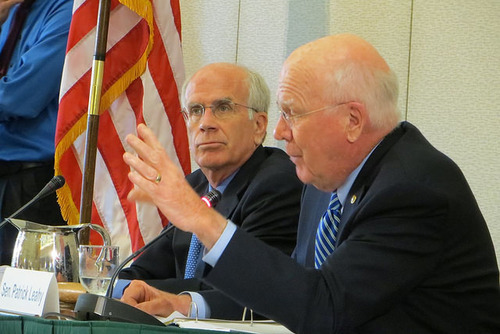
The good news is that, after a flurry of letters from Democratic lawmakers calling on the FCC to invoke Title II, two leading Democrats, Senator Patrick Leahy (D-Vt.) and Congresswoman Doris Matsui (D-Calif.), are proposing a narrower legislative solution instead. The bad news is that they’re repeating the same blatant lie that President Obama used to support his call for Title II. Their press release said:
“Nearly 4 million Americans wrote to the FCC last year in support of a free and open Internet and against a two-tiered system.”
Obama’s November speech said:
“I am asking the Federal Communications Commission to answer the call of almost 4 million public comments, and implement the strongest possible rules to protect net neutrality.”
In fact, roughly 25% of those four million comments clearly opposed Title II or strict regulation — a fact that should have been obvious to anyone actually paying attention to the details. So either Democrats aren’t paying attention — or they’re willing to twist the facts to fit their narrative.
Either way, it’s not encouraging.
We’re inclined to give the President himself the benefit of the doubt. The other obvious errors in his November speech, like referring to Title II of the Telecommunications Act of 1996 (instead of the Communications Act of 1934), suggest that the speech was written by political hacks, not policy people — and probably continually reworked until the last minute. He probably didn’t realize that what was was saying was blatantly untrue. But that explanation is no less discouraging, because it suggests that this debate has become entirely about politics.
Democrats aren’t alone in using overheated rhetoric, of course. Sen. Ted Cruz missed the mark when he called net neutrality “ObamaCare for the Internet.” He should have focused on the real problem, Title II, instead of ceding the rhetorical abstraction of “net neutrality” to Democrats.
We all want an “open and free” Internet. The question is how we get there. We continue to believe only Congress can provide a durable solution that addresses core concerns about competition without giving the FCC a blank check to regulate the rest of the Internet or slowing the investment needed to continue bringing better, faster service — and more competition — to all Americans.
Which side ginned up the most comments (auto-generated from petition sites on both sides) matters a lot less than getting the right answer. Finding a legislative solution is going to require, from both sides, compromise, good will, and above all, intellectual honesty. Without that, this decade-long fight is just going to continue as the FCC goes back to court and, probably, loses for the third time — the tech policy version of Groundhog Day.
UPDATE: Further analysis of the comments found that 41% of commenters opposed net neutrality regulation and/or Title II.
